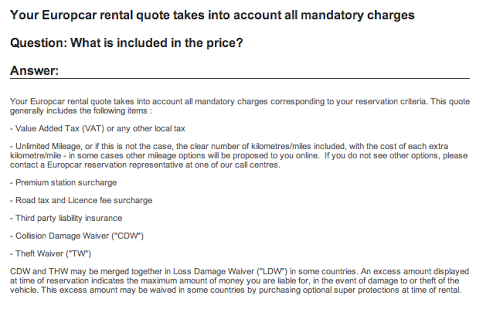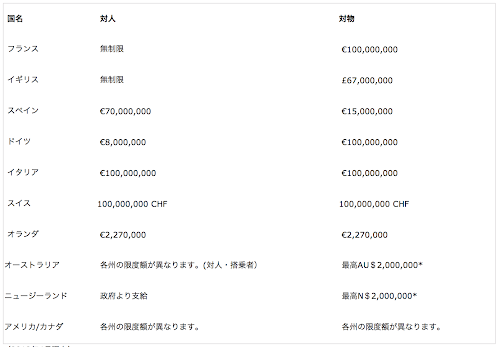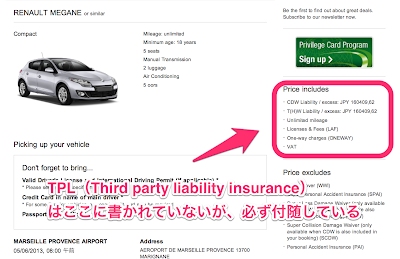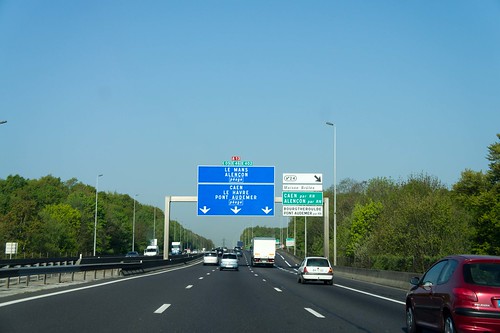When driving in a foreign country, what will happen in the event of an accident is naturally one of the concerns.
Of course there is insurance when you rent a car in Europe, but I’ll try to summarize it in my own way.
There are three types of insurance that are always included in Europe
ヨーロッパでクルマを借りる場合は、1つの強制保険と2つの任意保険が必ずついています。
It is also included in the basic rental fee, so you don’t have to pay any additional fees.
The three policies are as follows
|
Types of Insurance |
contents |
|---|---|
|
Compulsory third party liability insurance (TPL or TI) |
It is a compulsory insurance that all countries require you to have, so you basically don’t need to check. It guarantees the payment when the other party is injured by the accident or the other party’s car, building, etc. are damaged. There seems to be a difference in the guaranteed limit depending on the country, but the limit is basically high. |
|
Collision Damage Waiver (CDW) |
It may be compulsory or optional depending on the country or company, so you need to check. If the accident is not caused by the driver’s intention or extreme carelessness, the insurance will cover the cost of damage caused by “collision with a stationary or moving object”, “being involved in a riot”, “damage to windows, lights or tires caused by a collision”, or “natural disaster (often defined by the law of the country)”. (often defined by the laws of the country)”. |
|
Theft Waiver (TW) |
This is a guarantee in the event of theft or attempted theft of the rented vehicle or vehicle accessories. It is important to note that there is a deductible and that it is not applicable in cases of obvious driver negligence. |
You can find these on each company’s website, but many of them are in English or difficult to read, so it is hard to understand if you are not familiar with them. However, I think it is better to remember that there are these three for now.
(See)
Europcar(日本語) http://www.europcar.jp/cgi-bin/page.cgi?ID=1300&MID=2853&LANG=JA&METID=2318
Car Rental Abroad Info – SIXT http://www.sixt.com/rental-services/rental-information/
You can look it up on the internet or ask about it in Japan when you can make a reservation in Japanese, but sometimes the information is outdated, so I think it’s useful to be able to ask about these three things directly at the site.
The answer will be, “Of course it’s in there.”
Compulsory third party liability insurance (TPL or TI)
This is the only one of the three default insurances that is “compulsory” and is sometimes abbreviated as TPL or TI.
It is a very basic content and guarantees the payment when the other party is injured or the other party’s car, building, etc. are damaged by the accident.
There seems to be a difference in the guarantee limit depending on the country, but basically, the limit is high, so you can rest assured.
繰り返しとなりますが、TPLは必ず付随している保険ですので、追加でチャージを取られない、オプションで付随するか聞かれない保険です。
In the case of Europcar, for example, it is not mentioned in the confirmation you receive after applying, which makes you feel uneasy, but it is a compulsory insurance that comes with it.
Collision Damage Waiver
To be precise, it is not insurance, but a “vehicle damage guarantee system”, which exempts or reduces the contractor’s burden of damage in the event of damage to the rented vehicle due to an accident, etc.
こちらは任意保険ではありますが、ほとんどのレンタカー会社では通常契約で必ずついていることが多い保険です。ということで、TPL同様、追加で申込を求められることはありません。
There is a deductible for this insurance. It varies from about 50,000 yen to more than 100,000 yen depending on the country, exchange rate, etc., so you need to confirm it for each reservation.
Of course, you can also reduce your deductible by paying an additional optional fee. (See below.)
By the way, I don’t think it’s unlikely that you’ll be charged extra if you scrape the bumper a little. I’ve rubbed my bumper a few times, but I’ve never been charged for it. (Of course, there is a possibility that you will be charged depending on the case, so please judge at your own risk.
Theft Waiver (Auto Theft Insurance)
こちらも任意保険ではありますが、契約時に自動的についてくる保険で追加費用は発生しません。
It is a guarantee in the event of theft or attempted theft of the rented vehicle or vehicle accessories. It is important to note that there is a deductible and it does not apply to cases where the driver is clearly at fault.
It tends to be thought that it is easy to be caught in the trouble of the theft from the relation of the security when it is overseas. It is written in the guidebook that you should be careful about the theft by breaking the window glass especially.
However, I think the guidebook is a bit over the top.
However, of course, you should take the minimum necessary precautions (do not leave valuables in the car, put your luggage out of sight when you leave the car, etc.). In the city, use underground parking lots with fees if possible. ), but I don’t think it’s something to be overly afraid of.
Like CDW, TW also has a deductible. It is possible to reduce the deductible as an option (for a fee).
Paid options for insurance other than the above: full cover, SCDW, etc.
There are three types of insurance that are always included in the rental contract. The others are optional and charged.
The typical ones are “Normal Use Parts Indemnity (WWI)”, “SCDW/SLDW” and “Passenger Accident Insurance (PAI)”.
Of these, the one most likely to be used is “normal use parts coverage (WWI),” often referred to locally as “full coverage,” and almost always asked at the counter, “Do you want full coverage?” (Is this unique to Europe?). (Is this unique to Europe?).
Insurance that covers windshield, window and tire damage that is not covered by the default CDW.
As a matter of fact, last year, I damaged my windshield only when I was not in this. The problem was that a stone flew from somewhere while driving at high speed….
旅のトラブルその2 高速道路走行中、フロントガラスに石が直撃しヒビが入る -2012 France and Spain | my lifelog yuu-koma.jp http://www.yuu-koma.jp/?p=8403
But I don’t know, but I ended up paying only about 100 euros, even though I was told that I might have to pay about 740 euros.
Accidents that cause cracks in the windshield are extremely rare, but I’ve come to think that it’s better to have “full coverage” even if it’s a little more expensive.
Note that when adding full coverage locally, you should ask, “Does this policy cover additional windows, tires, etc.?” It’s better to ask.
There are still some unconfirmed aspects, so we will continue our research.
So, for my own sake, I have tried to organize the insurance for European car rental, but there are still many parts that I do not understand well. I hope I can continue to rent a car there and gain more experience and knowledge to deepen my understanding of insurance.
If there are any mistakes in this entry, I would appreciate it if you could point them out. Thank you very much for your cooperation.
- There are three types of insurance that are always included in Europe
- Compulsory third party liability insurance (TPL or TI)
- Collision Damage Waiver
- Theft Waiver (Auto Theft Insurance)
- Paid options for insurance other than the above: full cover, SCDW, etc.
- There are still some unconfirmed aspects, so we will continue our research.
- (Postscript) February 2017
(Postscript) February 2017
Summary of insurance for rental cars + more
There is some overlap with the previous section, but I’ve added some new information that I’ve researched since then. I will continue to refer to my own experience and Europcar’s site for explanation.
a. There are three basic types, TLI, CDW, and TW
ヨーロッパレンタカーでの保険の基本は次の3種類です。TLIは強制保険ですが、[highlight]CDW、TWについては絶対に付随しているか確認が必要[/highlight]です。この3種類は、会社によってはデフォルトの保険となっている場合もあります。
|
Types of Insurance |
contents |
|---|---|
|
Compulsory third party liability insurance (TPL or TI) |
It is a compulsory insurance that all countries require you to have, so you basically don’t need to check. It guarantees the payment when the other party is injured by the accident or the other party’s car, building, etc. are damaged. There seems to be a difference in the guaranteed limit depending on the country, but the limit is basically high. |
|
Collision Damage Waiver (CDW) |
It may be compulsory or optional depending on the country or company, so you need to check. If the accident is not caused by the driver’s intention or extreme carelessness, the insurance will cover the cost of damage caused by “collision with a stationary or moving object”, “being involved in a riot”, “damage to windows, lights or tires caused by a collision”, or “natural disaster (often defined by the law of the country)”. (often defined by the laws of the country)”. |
|
Theft Waiver (TW) |
This is a guarantee in the event of theft or attempted theft of the rented vehicle or vehicle accessories. It is important to note that there is a deductible and that it is not applicable in cases of obvious driver negligence. |
Other insurance options include coverage for injuries to the driver and theft of the driver’s luggage.
b. Insurance against self-inflicted accidents
[highlight]自損事故(self-inflicted accident)[/highlight]については、国や会社によってCWDでカバーしていない場合もありますので、さらに確認しておくとよいです。
My experience has been that Europcar had coverage for self-inflicted damage in France and Spain within CDW, but I don’t think it was included in Italy. When we used Sixt in Germany, it was not included either. At that time, we decided to pay about 100 euros for the additional insurance to cover the default 500 euros for a 9 day rental.
ただし、rentalcars.comを通して借りる場合は、rentalcars.com独自の保険制度である「自車輌損害補償制度(Damage Excess Refund: DER)」があり、この場合には、自損事故の保証も保障されます。ただし、一旦現地レンタカー会社に支払いをしてから、別途、rentalcars.comに申請手続きをする必要があるので注意してください。
In my experience, when I had a self-inflicted accident in Southern Italy, I was almost fully covered for all payments except for commission, business guarantee fee and VAT.
非常によい精度であり、私がrentalcars.com利用を強く進める根拠にもなっています。イタリア(特に南イタリア)は他のヨーロッパ諸国と比べると運転が乱暴なので、特にrentalcars.com経由で申込みこの保険を支払ったほうがよいと考えています。






